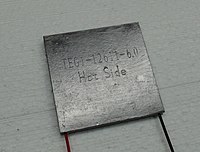
Photo from wikipedia
Abstract Thermoacoustic refrigeration technology is a green alternative for the conventional refrigeration system in vehicles. The former uses environmentally friendly inert gases whereas the latter uses chemical refrigerants that can… Click to show full abstract
Abstract Thermoacoustic refrigeration technology is a green alternative for the conventional refrigeration system in vehicles. The former uses environmentally friendly inert gases whereas the latter uses chemical refrigerants that can have severe impacts on the environment. In order to apply thermoacoustic technology in the automobile industry, the size and the weight of plausible thermoacoustic refrigerators should be decreased. The design of a new compact thermoacoustic refrigerator is described in this study. This thermoacoustic refrigerator uses two electroacoustic components and one thermoacoustic core. The technical details of design, fabrication, and testing processes are presented. A methodology for thermal design of the heat exchangers is proposed and validated by measurements. The effects of different parameters, such as the driver piston displacement amplitude, the phase shift between the voltage signals applied to the electroacoustic components, and the cold side temperature on the performance indices of the refrigerator are investigated. The performance of the prototype is compared with the performance calculated by the DeltaEC design model. The overall agreement between the calculated and the measured performance parameters is fair, but further insight into the temperature distributions reveals that non-linear effects yield discrepancies between the model and the experimental results. A preliminary discussion of the origin of these discrepancies is proposed.
Journal Title: Applied Thermal Engineering
Year Published: 2021
Link to full text (if available)
Share on Social Media: Sign Up to like & get
recommendations!